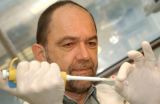Talented bacteria make food poisoning unpredictable
2010-09-06
(Press-News.org) While we are often exposed to bacteria in our food which could cause food poisoning, we don't always become ill - why should this be so?
Professor Colin Hill who is presenting his work at the Society for General Microbiology's autumn meeting in Nottingham today describes how bacteria use different tricks to aid their survival inside the body, helping to explain why food poisoning can be so unpredictable.
One of the biggest challenges faced by food-borne bacteria is acid. Acidic conditions, particularly in the stomach and in the gut will kill most microbes found in contaminated food.
Professor Hill's group at University College Cork has revealed that Listeria bacteria, which may be found in soft cheeses and chilled ready-to-eat products, can overcome harsh acidic conditions by exploiting key food ingredients. Listeria that survive are able to cause serious and sometimes fatal infections, particularly in the elderly and pregnant women.
Certain food constituents such as the amino acid, glutamate, can help the bacteria neutralise acid, allowing the bacteria to pass through the stomach unscathed. Professor Hill explains the significance of this. "People who consume foods that are contaminated with Listeria and are also high in glutamate, such as soft cheese or meat products, have a higher chance of developing serious infection than someone eating the same quantity of bacteria in a low-glutamate food," he said. "Of course this is further complicated by the fact that a contaminated, low-glutamate food could be eaten in combination with a high-glutamate food such as tomato juice, which could also increase the risk of infection."
Listeria can also take advantage of food processing and storage conditions to help them survive. "Bacteria that are exposed to low pH before entering the body may adapt to become more acid-tolerant and therefore better equipped to deal with acidic conditions in the body. For example, Listeria contaminating naturally acidic foods such as cheese may be more likely to cause infection than Listeria carried at a more neutral pH in water.
Professor Hill explains how his group's work could help reduce the incidence of Listeria infections. "The number of cases of listeriosis has nearly doubled in the last decade in Europe. This is because the bacterium is so good at overcoming the challenges it faces in food and in the body," he said. "Our studies show that consuming Listeria in one food may be quite safe, while eating the same amount in another food might be lethal. By understanding the role of the food matrix we may be able to identify and eliminate high-risk foods from the diet of susceptible people."
INFORMATION: END
ELSE PRESS RELEASES FROM THIS DATE:
2010-09-06
TORONTO, ON - Widespread reports of a decline in the population of bees and other flower-visiting animals have aroused fear and speculation that pollination is also likely on the decline. A recent University of Toronto study provides the first long-term evidence of a downward trend in pollination, while also pointing to climate change as a possible contributor.
"Bee numbers may have declined at our research site, but we suspect that a climate-driven mismatch between the times when flowers open and when bees emerge from hibernation is a more important factor," says James ...
2010-09-06
STOCKHOLM (6 September 2010)—Against a backdrop of extreme weather wreaking havoc around the world, a new report warns that increasingly erratic rainfall related to climate change will pose a major threat to food security and economic growth, especially in Africa and Asia, requiring increased investment in diverse forms of water storage as an effective remedy.
"Millions of farmers in communities dependent on rainfed agriculture are at risk from decreasing and erratic availability of water," said Colin Chartres, director general of the Sri Lanka-based International Water ...
2010-09-06
CAMBRIDGE, Mass. -- Plants are good at doing what scientists and engineers have been struggling to do for decades: converting sunlight into stored energy, and doing so reliably day after day, year after year. Now some MIT scientists have succeeded in mimicking a key aspect of that process.
One of the problems with harvesting sunlight is that the sun's rays can be highly destructive to many materials. Sunlight leads to a gradual degradation of many systems developed to harness it. But plants have adopted an interesting strategy to address this issue: They constantly break ...
2010-09-06
SANTA CRUZ, CA--A tiny optical device built into a silicon chip has achieved the slowest light propagation on a chip to date, reducing the speed of light by a factor of 1,200 in a study reported in Nature Photonics (published online September 5 and in the November print issue).
The ability to control light pulses on an integrated chip-based platform is a major step toward the realization of all-optical quantum communication networks, with potentially vast improvements in ultra-low-power performance. Holger Schmidt, professor of electrical engineering in the Baskin School ...
2010-09-06
One of the key drivers of human evolution and diversity, accounting for changes that occur between different generations of people, is explained by new research published today (Sept 5) by world-renowned scientist Professor Sir Alec Jeffreys, who discovered DNA fingerprinting at the University of Leicester.
Professor Jeffreys has spent over two decades since his landmark discovery in 1984 investigating what he describes as "pretty bizarre bits of DNA" - highly variable repeated parts of DNA called 'minisatellites' - found in the human genome. Sir Alec observed that ...
2010-09-06
Biologists at the University of California, San Diego have discovered that a gene critical for programmed cell death is also important in the loss of adult stem cells, a finding that could help to improve the health and well-being of patients undergoing cancer treatment.
"During chemotherapy or radiation therapy that kills cancer cells by inducing significant DNA damage in their genomes, one of the main side effects for human cancer patients is the depletion of their own adult stem cells, particularly the ones responsible for making new blood and intestine cells. So these ...
2010-09-06
A new website providing busy mums with a central point to discover businesses that provide home delivery and in-home services was recently launched.
The new website - http://www.mumsdelivery.com.au - is a business directory for mums interested in shopping and arranging in-home services from the comfort of their own home. The website is intuitive and easy to navigate, making it simple for users to find the businesses they are looking for.
Mums today are particularly technologically savvy. The 'online mum' demographic is emerging as one of the fastest growing segments ...
2010-09-06
The Bornmann Law Group, PLLC, a debt relief agency servicing all of Arizona, has launched their new informational and advisory blog, http://www.bankruptcy-az.com/wordpress/. This bankruptcy themed blog is written by bankruptcy attorneys and bankruptcy lawyers who advise and help people file for bankruptcy relief under the Bankruptcy Code.
Their blog focuses on bankruptcy planning, Chapter 7 and Chapter 13 filing options, advice on wage garnishments and repossessions, bankruptcy law and advice for those that are experiencing extreme financial difficulty. Recent articles ...
2010-09-06
Movage Movers Enjoy Summer 2010 Discount
1 Month Free Storage with Movage Moving & Storage.
Our qualified staff of professional movers and fleet of new trucks will meet all of your moving needs. We carefully screen all our employees and regularly train them in the latest packing and moving methods. Our crews utilize state-of-the-art equipment to safely transport and deliver most fragile furniture, machinery, fine arts and pianos.
Each vehicle in our fleet is equipped with a Real-Time Vehicle Tracking System, aka GPS (Global Positioning System). Real-time vehicle tracking ...
2010-09-06
'Stop the Insanity' Your Thoughts Aired on Social Radio Network BlogTalkRadio
'Stop the Insanity' tackles America's Political Problem live on Monday-Thursday, starting September 6th, 2010 at 9 a.m. Mountain Standard time
The question on every American' s mind today is how to 'Stop the Insanity' will be the focus of BlogTalkRadio 'Stop the Insanity' (http://blogtalkradio.com/charleymiller2010) with host Charley Miller on every Monday - Thursday, starting September 6th, 2010 at 9:00 am Mountain Standard time. The show will feature Charley Miller, who will be on the ...
LAST 30 PRESS RELEASES:
[Press-News.org] Talented bacteria make food poisoning unpredictable


